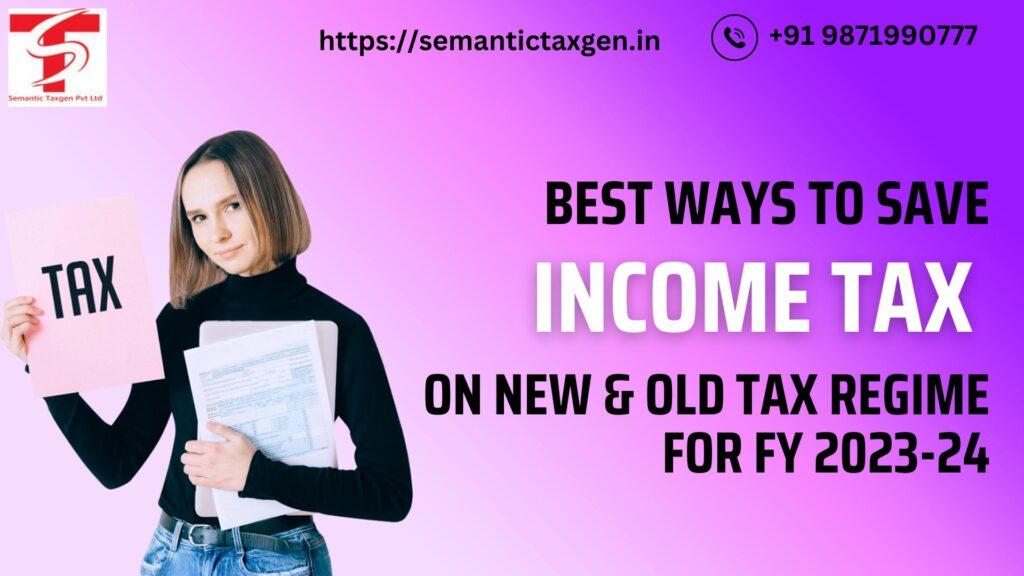
In the financial year 2023-24, the taxpayers in India have a choice to select either the old regime of the income tax with provisions of performance of deductions & exemptions or the new regime of income tax with less number of rates but with no exemptions. However, whether you go for the first, second, or any other option, it is always advisable to look for other greener pastures within the legal ambit for claiming a higher tax credit. Below is a detailed view of how you can effectively minimize max under both regimes so that additional taxes are paid only where necessary.
Invest in instruments such as PPF, EPF, NPS, insurance premium payments for the life cover, and ELSS funds. Under Section 80 C, the maximum deduction allowed is Rs. 1. 5 lakh.
But, if you have availed a home loan for a let-out house, which is ‘self-occupied’, you can claim the interest paid within ₹2,00,000 under Section 24(b). In the case of houses that are rented, then the interest in full is chargeable against rental income.
You may also obtain deductions for insurance on health against premium paid for self, spouse and dependent children under Section 80D. The standard deduction limit is ₹ 25,000 for resident individuals below the age of sixty years and ₹ 50,000 for resident individuals of sixty years or more at any time during the relevant financial year.
In case you are an individual borrower and you have taken an education loan for yourself, for your spouse, or children then you can avail a deduction on the interest paid as per Section 80E.
Section 80G of the Act allows deductions to certain approved funds & charitable organisations arising out of donations.
Extra tax deductions are available for investors under Section 80CCD(1B) on investments made in the corpus of NPS.
But as much as the new tax regime does not allow for tax reliefs especially deductions & exemptions, it allows for lower tax rates, which may suit individuals with smaller taxable incomes or small amounts they can claim under the available deductions. Here’s how you can make the most of it:
Prepared under the new regime, provided less number of options with tax slabs starting from 0% till ₹ 3 lakhs income to maximum of 30% for income above ₹ 15 lakhs.
There are two types of deductions available – under the 80C bracket and other deductions •Salaried employees/taxpayers/pensioners can avail a standard deduction of ₹ 50,000.
The basic structure of income tax taxation slabs for the individuals is as follows: As per the Indian Tax exemption, people having Total Gross Income less than or equal to ₹7,00,000 get a tax rebate, which makes their tax amount to NIL.
What you can’t claim are deductions such as section 80C, home loan interest, health insurance premiums, etc now under the new regime. On the other hand, the amount contributed by the employer can be claimed by you under Section 80CCD(2) for tax deduction.
To establish which regime is more applicable for your best interests, there is the necessity to factor the income level, eligible deductions, and one’s circumstances. Here’s a general guidelines:
– If the total eligible deductions in the base year exceed the amount of tax savings that can be realised under the new regime, then the old one is probably better.
– For business owners with little eligibility on deductions or individuals in the lower brackets, the new regime may lead to better tax savings.
To get maximum tax benefits, as an individual it would be wise to either calculate the taxes under the present tax regime or the new tax regime depending on which would give the maximum benefit.
Consider tax-saving funds such as ELSS (Equity Linked Savings Schemes), that would help save tax and appear as growth-oriented funds.
For individuals living in a rented house or premise, make sure they have receipts to support their claims for House Rental Allowance (HRA).
Furnish required billing records to your employer and get reimbursed on medical, conveyance or leave travel allowance among others.
It is also suggested that individuals embrace other accounts such as Public Provident Fund (PPF) or National Pension System (NPS) in order to secure tax exemptions as well as accrete retirement wealth.
Consult a tax consultant or financial advisor to align your tax-planning manner and be updated with the laws & policies followed in your country.
Substituting all available taxes with tailored strategies, you will considerably lower your total amount of payable taxes and raise the net income. Just remember, Tax preparation is not a one-time event but you need to keep an eye on the tax planning exercise and review the investments and deductions periodically in relation with your financial objectives and the existing laws.
Navigating the Deductions in the Old Tax Regime: Understanding the Essentials
Navigating the Deductions in the new tax regime: Understanding the Essentials
To Receive or Inquire about the NGO Taxation services check out our website: https://ngopilot.in/
DISCLAIMER: The information provided in this article is intended for general informational purposes only and is based on the latest guidelines and regulations. While we strive to ensure the accuracy and completeness of the information, it may not reflect the most current legal or regulatory changes. Taxpayers are advised to consult with a qualified tax professional or you may contact to our tax advisor team through call +91-9871990777 or info@semantictaxgen.in the appropriate government authority to verify the accuracy of the information and to obtain advice on their specific tax situations.
© 2013-25 Semantic Taxgen Pvt Ltd - All Rights Reserved